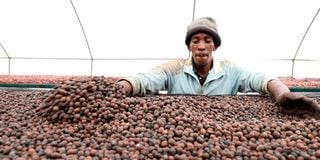Premium
Prices boom for Kenya coffee farmers, traders

Edward Mutura Wacuka, 29, a worker at Rui-Ruiru Coffee Factory on July 19, 2022.
What you need to know:
- Kenyan coffee farmers may be set for an earnings boom following a major crop failure in Brazil, the world’s leading producer.
- Market analysts project a sharp rise in the global prices of coffee after extreme weather conditions impacted the coffee crop in Brazil.
- The high prices are expected to prevail in the medium-term on the suppressed Brazilian crop, translating to better earnings for Kenyan producers.
Kenyan coffee farmers may be set for an earnings boom following a major crop failure in Brazil, the world’s leading producer.
Market analysts project a sharp rise in the global prices of coffee after extreme weather conditions impacted the coffee crop in Brazil amid projections that the South American nation will produce 35.7 million bags of coffee in the year starting July — nearly 27 per cent lower than its record output two years ago.
“It goes without saying that the disrupted crop will translate to gains for Kenya in terms of higher prices,” Mr Daniel Mbithi, the chief executive officer of the Nairobi Coffee Exchange, told Sunday Business.
Brazil experienced bad weather last year after being hit by both drought and frost. Earlier in 2020, Brazil had produced a record 48.7 million bags of coffee.
Severe frosts in July damaged a large part of fields in the main Brazilian coffee belt, sending prices of Arabica coffee rising by up to 20 per cent — the highest in nearly seven years.
Arabica coffee futures prices for September, for example, hit $2.15 per kilo, the highest for the front month since October 2014.
Better earnings
The high prices are expected to prevail in the medium-term on the suppressed Brazilian crop, translating to better earnings for Kenyan producers.
This compounds a drop in output by South America’s main producers, Brazil and Colombia, with a report by the International Coffee Organisation(ICO) showing that exports of the commodity from the region declined by 8.5 per cent to 42.26 million bags between October 2021 and June 2022.
During the nine months, shipments from Brazil declined by 14.2 per cent to 29.5 million bags from 34.4 million bags
“Continuing issues with availability of containers and shipping capacity, albeit with reported improvements in recent months, and a smaller crop harvested during its Arabica ‘off-season’, are the main reasons for the sharp fall,” ICO said in its report for July.
The volume of exports from Colombia was down 1.6 per cent for the first nine months of the coffee year 2021/22 at 9.24 million bags, versus 9.4 million bags for the same period last year.
“The fall in exports is linked to persistent unfavourable weather conditions reducing the available coffee supply in the country,” ICO said.
The price boom may, however not fully benefit growers amid dropping output as some growers dumped the crop for other better rewarding ventures such as real estate. Coffee output is this year also likely to be impacted by costly inputs such as fertiliser.
The US Department of Agriculture (USDA) projects Kenya’s coffee production in the 2022-23 season to drop by 10 per cent to 700,000 bags on the back of rising prices of fertiliser.
"Kenya's 2022/23 coffee production is forecast to decrease by 10 per cent to 700,000 bags due to lower yields caused by reduced fertilizer application,” the US government said.
“Crop 2022/23 planted area is anticipated to remain flat at 105,000 hectares as new plantings are curtailed by a shortage of coffee seeds." It added.
The surge in global fertiliser prices began at the beginning of 2021 due to the impact of the Covid-19 pandemic. The ongoing war between Russia and Ukraine has worsened the situation.
Currently, fertiliser prices in Kenya stand at Sh6,000 per 50-kilogramme bag, a 71 percent increase from a year earlier.
The rise in prices is also due to producer countries such as China, Russia, and Turkey restricting exports to protect their farmers compounded by heavy consumption demand from India, Brazil, and the US buying up large quantities, hence reducing available global supplies.





